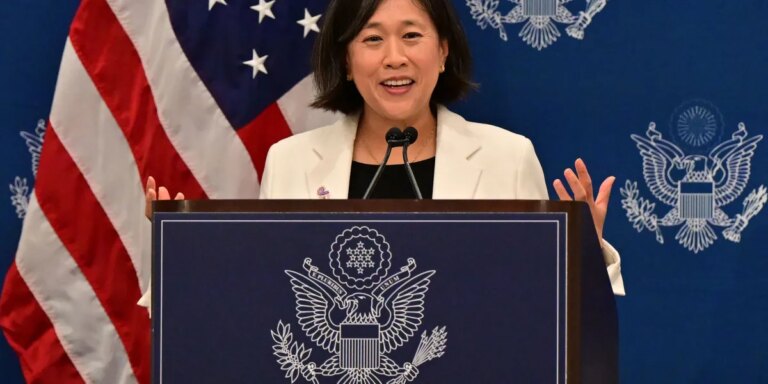The Office of the United States Trade Representative (USTR) under Katherine Tai is a scaled-down version of its former self, and may actually be hurting the U.S. economy and U.S. business.
On March 28, the Office of the United States Trade Representative (USTR) released its annual report. National trade estimation report on foreign trade barriers– Often long and technical documents, but usually not much publicized. However, this year's report referred to the “sovereign right” of all governments to “govern in the public interest.” This allows governments to impose tariffs and other trade barriers if they assert a public interest, making this an important axis for the USTR.
This surprising move is part of a larger pattern emerging in the Biden administration, which has adopted a trade policy approach that goes against traditional U.S. foreign policy.
The USTR may simply be taking a protectionist stance in support of the administration's “Buy America” policy. But the agency will turn inward and abandon thousands of U.S. companies that facilitate about $250 billion in trade in goods and services across the border. In short, the authorities seem to have forgotten the “United States” in USTR.
The latest decision follows a similar puzzling decision by the USTR to withdraw support for key digital trade provisions at the World Trade Organization (WTO). These proposals, supported by both the former USTR and many global allies, aim to protect cross-border data flows, prohibit data localization obligations, and protect intellectual property. I was there. They advance the principles of fair trade and open markets that America has long championed and on which our innovation economy is built. By retreating from these countries, the US approach now resembles that of countries such as China, and risks legitimizing authoritarian practices that hurt innovation and undermine fair competition.
The justification for this sudden policy shift is flimsy at best. The argument that digital trade rules will unfairly benefit big U.S. technology companies at the expense of small businesses completely ignores reality. Digital trade barriers, such as data localization requirements and forced disclosure of source code, disproportionately hurt small and medium-sized enterprises, hindering their ability to compete on the world stage.
The USTR's decision risks jeopardizing America's leadership in shaping global trade norms and undermining America's moral authority on the world stage. USTR must stop using foreign policy to support misguided domestic competition policies. Instead, authorities should recommit to strong trade policies that prioritize the interests of U.S. companies of all sizes.
The United States has a proud and successful history of leading in open and fair trade. As protectionism and authoritarianism rise around the world, our governments must stand firm to protect those values and interests. Sound trade policy is not only about economic prosperity, but also about protecting the principles that define us as a nation.
The time to act now is before irreparable damage is done to America's standing in the global economy and the health of the international trading system. Otherwise, it would be an abdication of American leadership and certainly a departure from the norm. No matter where American innovation happens, if our nation's leaders don't champion it, who will?
Ed Brzytwa is Vice President of International Trade for the Consumer Technology Association (CTA).
More must-read commentary published by luck:
- Union Leader: Larry Fink is right about the retirement crisis facing Americans, but can't tell the truth about the failure of the '401(k) revolution'
- We analyzed 46 years of consumer sentiment data. They found that today's “vibrancy” is simply a sign that men are starting to feel the same bad feelings about the economy as women have historically felt.
- 90% of homebuyers have historically chosen to work with a real estate agent or broker. Here's why that's likely not going to change, according to the National Association of Realtors.
- Intel CEO: “Our goal is for at least 50% of the world's advanced semiconductors to be produced in the United States and Europe by the end of the 20th century.”
The opinions expressed in Fortune.com commentary articles are solely the views of and do not necessarily reflect the views of the author.


